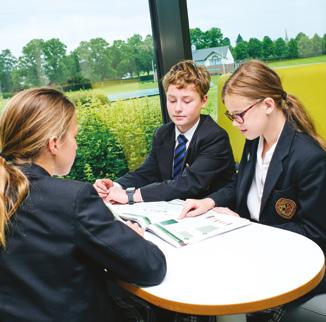
2 minute read
The Lower School Curriculum – ages 10–13
THE LOWER SCHOOL CURRICULUM
(AGES 10–13)
Advertisement
In 2021 Oakham received official accreditation to become an International Baccalaureate MYP World School following three years of successfully embedding the programme across the Lower School.
IB MYP is a curriculum organised by big ideas, with conceptual learning allowing students to make connections across the curriculum for deeper understanding. With IB MYP, Global Contexts explain why what students are learning is relevant to their world, and Approaches to Learning develop students’ confidence and capability in 21st century skills.
Overarching this is the IB Learner Profile, which helps students to develop as people, and to become responsible and reflective global citizens with an international outlook. Exploring deeper, conceptual and debatable questions gives students a thorough disciplinary and interdisciplinary understanding: they still learn the subjects one would expect, but see the links between them to enable them to forge new ideas and use what they learn in less familiar situations.
Typically pupils join Oakham in Form 1 but some choose to join Oakham in Lower 1 (10+). Lower 1 is the equivalent of the final year of primary school and particularly suits pupils who would benefit from an early introduction to Oakham School life. Lower 1 pupils follow a timetable that is grounded in primary teaching and each class has a primary specialist class teacher and a classroom base, on the separate Jerwoods campus where pupils are taught the majority of their lessons. Pupils benefit from a broad and holistic curriculum, and are developed effectively as independent learners through the FOSIL framework. Subject specialists teach Form 1 in a dedicated suite of classrooms on the Jerwoods campus, with pupils benefiting from the wider facilities of the School for the Creative and Performing Arts subjects, PE, and Science. In preparation for the transition to Middle School, Form 2 pupils have their lessons in the wider school campus.
Free from the constraints of teaching for Common Entrance or National Curriculum assessment, we give pupils a solid grounding in the subjects listed below, but we also use these years to develop essential core academic skills and habits. We work to ensure that our youngest pupils are effective learners in their own right. This empowers them to take responsibility for their own progress. Our innovative approach encourages links between different subjects, showing learners how to see beyond the narrow requirements of a particular exam and transfer their learning skills to new situations.
Pupils study English, French, Geography, History, Computer Science, Mathematics, Religious Education, Science, Latin (most pupils) and Creative and Performing Arts. In Form 2 they add Spanish and German, selecting one during the year for further study. Afternoons are divided between sport and a wide choice of activities within and beyond the timetable. Trips enhance what has been learned in class and the annual Form 1 Exploring Learning Camp is an important way to consolidate new skills.
Lower School pupils do not need to take an entry examination in order to progress to the Middle School, although we do expect pupils to reach a standard equivalent to a Common Entrance pass of 55% or better.
Our innovative approach encourages links between different subjects, showing learners how to transfer their learning skills to new situations.”







